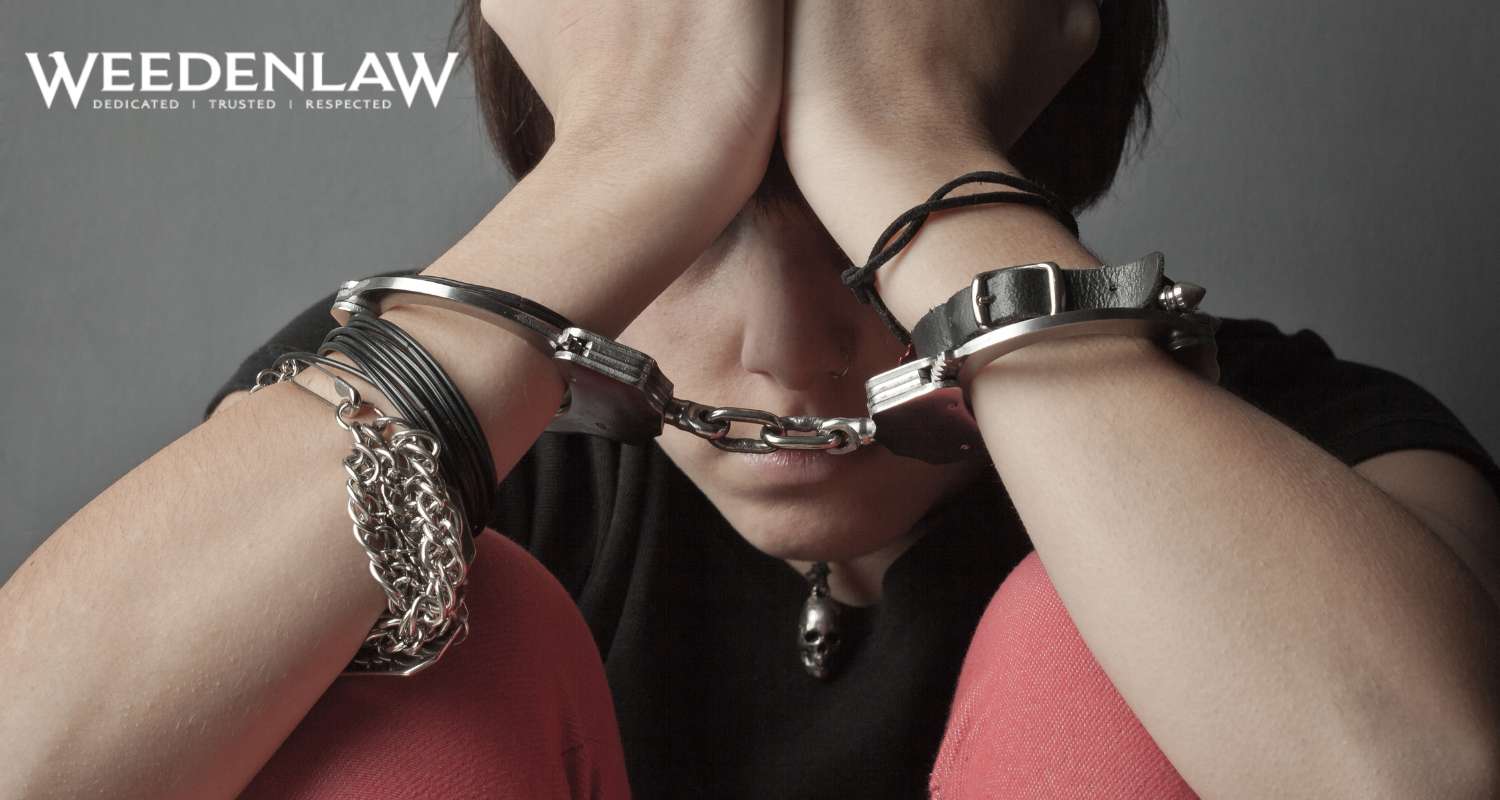In today’s digital world, cell phones, internet messaging, and social media have become a regular part of teenage life, but with these tools comes the growing concern of teen sexting. Many minors don’t realize that sharing sexually explicit images, even with other teens, may lead to criminal charges under Colorado’s sexting laws.
“Sexting” may seem like a modern form of teenage flirtation, but it can carry serious consequences. What may begin as a private exchange between two teens can quickly escalate into a legal situation involving criminal charges, school discipline, and long-term repercussions that impact a young person’s future.
At WeedenLaw, Jeff Weeden, a trusted Denver criminal defense attorney, understands how overwhelming these cases can be for both minors and their families. He has years of experience defending young clients accused of sexting and related offenses, working to protect their rights, reputation, and future. To speak with him regarding your situation, call (720) 307-4330 or contact us online today.
What is Sexting?
Sexting refers to the act of sending or receiving sexually explicit messages, videos, or photos via digital communication. For teens, this often happens through popular platforms like text messaging, Snapchat, Instagram, TikTok, or other messaging apps. These images depict nudity or sexual content and are often shared between teens as part of relationships or peer pressure situations.
While sexting among consenting adults may fall into a legal gray area depending on the context, the rules are very different—and much stricter—when it involves minors.
Sexting vs Other Sex Crimes
Sexting is a distinct crime, but it can still overlap with more serious sex crime charges in Colorado, such as sexual exploitation of a child or child pornography. Unlike consensual sexting, these crimes typically involve coercion, manipulation, or adult involvement, and they carry much harsher penalties, including potential sex offender registration.
Even in cases of child internet sexual exploitation, where the communication is entirely digital, minors can face the same legal consequences as adults if the conduct crosses certain legal thresholds.

Does Age of Consent Apply to Sexting?
Many parents and teens are surprised to learn that the age of consent (which is 17 in Colorado) does not protect minors when it comes to sexting laws. Even if two teenagers willingly exchange explicit messages or images, they can still face criminal penalties simply because the law treats these images as child pornography, regardless of intent or mutual agreement.
Is Sending Nudes as a Minor Illegal in Colorado?
Yes, it can be.
According to Colorado law, it is a crime for a person under 18 to knowingly possess, distribute, or display sexually explicit images of themselves or another minor. This means a teen who sends, receives, or even just saves nude photos on their phone could be charged, even if both parties are minors and the exchange was consensual.
What many don’t realize is that once these images are shared, even privately, they may be distributed beyond the intended recipient, putting teens at risk of criminal prosecution and reputational harm.
Colorado Sexting Laws
Colorado’s teen sexting law, outlined in C.R.S. § 18-7-109 and further clarified by House Bill 17-1302, was designed to address the growing issue of minors sharing sexually explicit photos through digital means.
C.R.S. § 18-7-109
Section 18-7-109 of Colorado’s Revised Statutes states:
Under Colorado state law, a juvenile commits the offense of posting a private image if they knowingly distribute or show a sexually explicit image of another person (who is at least 14 or less than four years younger) using digital or electronic means, and:
- The depicted person’s permission was not given;
- The recipient suffered emotional distress from an image they didn’t ask for; OR
- The depicted person had a reasonable expectation that the image would remain private.
It’s also a violation if the juvenile distributed a sexually explicit image of themselves and the recipient didn’t request it and was harmed by it.
Possessing a private image is also a crime if a teen knowingly possesses a sexually explicit image of another person without consent, unless they took reasonable steps to delete it or reported the initial viewing to a school resource officer or police within 72 hours.
If a juvenile committed what the law calls an exchange of a private image, meaning they sent or received a sexually explicit image where only the sender is shown and both teens believed it was shared willingly, it is considered a civil infraction. These cases often require participation in an education program addressing sexting risks through the school safety resource center or a small fine.
Penalties increase when there’s malicious intent, three or more images of distinct persons, or if there’s a prior adjudication, meaning the teen previously posted such content. Repeat or intentional offenses may be charged as a Class 1 or Class 2 misdemeanor, while possessing 10+ images involving distinct persons could increase a petty offense to misdemeanor charges.
The law also states that if a teen was coerced, threatened, or intimidated into sending or keeping such images, that may serve as an affirmative defense.
Colorado House Bill 17-1302
Recognizing that applying child pornography laws to teenagers may be overly harsh, Colorado passed House Bill 17-1302 to address sexting among minors separately. The bill created new, less severe misdemeanor offenses for consensual sexting between minors (as opposed to the adult penalties), providing law enforcement with more appropriate tools for handling these cases.
HB 17-1302 didn’t legalize sexting among minors, though. It simply reduced the severity of certain charges in specific situations. A teen can still face serious criminal consequences, especially if the images are shared without consent or involve younger children. Below are the juvenile penalties for sexting under Colorado law.

Legal Consequences of Sending Inappropriate Pictures as a Minor in Colorado
- Civil Citation: For first-time offenses involving consensual sharing of sexual images between minors, the offense may be handled with a civil citation. This often includes a requirement to complete a sexting education class, counseling course, or other appropriate program.
- Petty Offense: If a minor is found knowingly possessing or sharing a small number of sexual images without malicious intent, it may be charged as a petty offense, especially when no harm was caused and the images involved only the sender.
- Class 2 Misdemeanor: When juveniles share or possess images of others without consent or beyond what the law permits (10 or more separate images of at least 3 different people), the charge may rise to a Class 2 misdemeanor.
- Class 1 Misdemeanor: Class 1 misdemeanor charges may apply when images are shared without the depicted person’s permission and the images cause emotional harm or are part of intimidation, blackmail, or coercion. Prior adjudication and having multiple images can also lead to a Class 1 misdemeanor.
- Felony Charges: Felony charges can result if sexting involves adults, coercion, threats, or a significant age difference between the sender and recipient. Charges may also escalate to a felony if the content includes explicit and harmful sexual images or is part of a pattern involving repeat offenders.
In severe cases, such as when repeat offenders are involved or sexual exploitation of a child occurs, juveniles may even be transferred to adult court and face harsher penalties, including possible sex offender registration and long-term impact on their criminal record.
Can a Minor Go to Jail for Sexting in Colorado?
While it’s rare for a minor to serve jail time for a first-time consensual sexting offense, it is legally possible, especially in cases involving distribution without consent, repeated offenses, or aggravating factors like coercion or blackmail that may result in severe penalties. Judges in Colorado have discretion in juvenile cases, which is why early legal representation is critical to reduce consequences, pursue alternative sentencing, or secure placement in an educational program rather than face incarceration.
Can Juvenile Sexting Charges Be Sealed or Expunged?
Fortunately, Colorado allows certain juvenile criminal records to be sealed under specific conditions. If your child is convicted of misdemeanor sexting or other related criminal offenses, they may be eligible to petition for record sealing after completing all court-ordered requirements and waiting the appropriate time period.
However, felony charges are more difficult to seal, and not all offenses are automatically eligible. Working with an experienced Denver expungement attorney like Jeff Weeden can significantly improve your child’s chances of keeping a sexting-related charge off their permanent record (or avoiding a conviction altogether).

What Should Parents Do If Their Child Is Accused of Sexting?
If your child has been accused of sexting, it’s important to take the situation seriously, even if the exchange was between consenting teens. Here are the immediate steps parents should take:
- Do NOT delete any messages, images, or communication. This could be considered destruction of evidence and lead to additional legal problems.
- Do NOT allow your child to speak to police or school officials without an attorney present. Even well-meaning statements can be used against them.
- Contact a qualified Denver juvenile criminal defense attorney like Jeff Weeden immediately to review the facts, protect your child’s rights, and develop a defense strategy.
Many parents don’t realize how quickly a situation can escalate from a school matter to a criminal investigation. As such, taking FAST, informed action is critical.
How a Denver Juvenile Defense Attorney at WeedenLaw Can Help
At WeedenLaw, we understand that teens make mistakes, but those mistakes shouldn’t define the rest of their lives. Attorney Jeff Weeden has extensive experience handling juvenile sex-related charges, including cases involving consensual sexting, image sharing, and social media use.
We provide:
- Non-judgmental, compassionate legal guidance
- Strategic defense planning to challenge the prosecution’s evidence
- Assistance with record sealing and expungement
- A focus on protecting the future of your child, not just resolving the present charge
Whether it’s negotiating a reduced charge, pursuing diversion programs, or fighting for a full dismissal for juveniles charged with sexting in Denver, CO, our goal is to minimize the damage and support your family every step of the way.

Contact WeedenLaw for a Free, Confidential Consultation Today
If your child is facing sexting charges in Colorado, don’t wait to get legal help. These cases are complex, emotionally charged, and can have lasting effects. At WeedenLaw, we offer free, confidential consultations to discuss your case, explain your legal options, and help you make the right decision for your family.
Call us at (720) 307-4330 or reach out online today to schedule your free consultation today.














